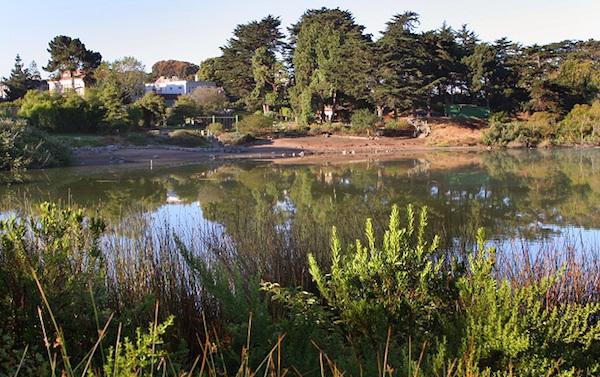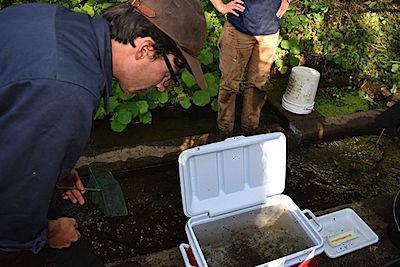
After years cleaning up Mountain Lake, The Presidio Trust is now working with partners to recovery native species to the freshwater lake/The Presidio Trust
With a multi-year cleanup completed, efforts are now under way to return native species that once called Mountain Lake home to the lake that's on the grounds of the Presidio in San Francisco.
With help from the Presidio Trust, along with area volunteers, hundreds of three-spine stickleback fish were released into Mountain Lake earlier this month. The stickleback were the first native species to be returned to the lake after an extensive, multi-year clean up and enhancement. The natural lake, one of only two in San Francisco, is located at the southern edge of the Presidio's border near the intersection of Lake Street and Highway 1.
'We are pleased to have the opportunity to revitalize Mountain Lake,' said Craig Middleton, Presidio Trust executive director. 'The restoration of the lake is a key initiative of the Trust and one of the many ways we are working with partners to steward the Presidio's natural areas.'
In 1776, Captain Juan Bautista de Anza's scouting party camped here before establishing the military outpost that would become the Presidio. Later the lake was a water source for the growing city of San Francisco. Mountain Lake's fresh waters have also long made life possible for plants, birds, and other wildlife.
Today, Mountain Lake is a peaceful oasis and popular visitor destination. It is also a living laboratory for restoration and is being brought back to health with the participation of the community.
Throughout much of the 20th century the lake's health declined due to many factors. In the 1930s, Highway 1 was built through the Presidio to the Golden Gate Bridge, dramatically reducing the lake's size and depth. Runoff from the roadway, a nearby golf course, and the surrounding city harmed the lake's water quality. Non-native species also found their way into the lake, causing some local plants and wildlife to disappear. Most of San Francisco's freshwater lakes and streams have disappeared, making Mountain Lake and the habitat it provides especially valuable.
The restoration and enhancement of the Mountain Lake took a major leap forward in 2013 as contaminated sediment from the highway was removed and the depth of the lake was increased by 50 percent. Habitat restoration is improving water quality and returning the lake to a more healthy and natural ecosystem. Native Submerged Aquatic Vegetation (SAV) was planted in 2014 to increase oxygen, provide habitat for the fauna, and prevent the growth of toxic algae through increased shading and sequestration of nutrients that start eutrophication of the lake.
'This is a rare opportunity to restore a natural lake in an urban area,' said Jonathan Young, Presidio Trust ecologist. 'We hope that research from this project will be help lake restorations in other areas of the country and the world.'
The enhancement work has made it possible to move forward with the recovery of several native plant and animal species that were confirmed to have been present in the lake at one time, but disappeared due to the poor quality of the lake and predation by and competition with non-native species.
The Trust is working closely with partners at: SF State University and the California Academy of Sciences (Chorus frogs and Pacific newts); Sonoma State University and the San Francisco Zoo (western pond turtle); Stanford University and Missouri State University (California Floater Mussel) on the native wildlife reintroductions.

Crews earlier this month released hundreds of Three-spine stickback into Mountain Lake at The Presidio/Amy Finke, The Presidio Trust
The Three-spine stickleback (Gasterosteus aculeatus) is the only fish species native to Mountain Lake. The stickleback plays an important role in aquatic ecosystems by controlling insects and providing food for native birds and reptiles. It is also a reproductive host for the freshwater California floater mussel. The stickleback disappeared from Mountain Lake with the introduction of predatory non-native fish and the subsequent loss of habitat. The fish still thrives in nearby Lobos Creek, where stickleback were harvested for the Mountain Lake release.
The Pacific chorus frog (Pseudacris sierra) was common in San Francisco into the early 1900s, but went into a steep decline and has almost disappeared entirely The species plays an important role in ecosystems by controlling the population of mosquitos and other invertebrates and providing food for other native animals.
Expected reintroduction of froglets: mid to late April, 2015.
Partner organizations: San Francisco State University and the California Academy of Sciences.
The Western pond turtle (Emys marmorata) is the Pacific Coast's only native freshwater turtle and was once common throughout Baja California north to Puget Sound, Washington. Ninety percent of the western pond turtle's habitat has disappeared, and non-native turtles (such as the red-eared slider once present in Mountain Lake) have pushed them out of their remaining habitat. The Presidio Trust is partnering with the San Francisco Zoo and Sonoma State University to reintroduce the western pond turtle into Mountain Lake. The San Francisco Zoo's 'headstart' program involves hatching and rearing turtles through their most vulnerable stages before releasing them into the wild. The Zoo is currently 'headstarting' young turtles in preparation for their reintroduction into Mountain Lake.
Expected reintroduction: June and August, 2015.
Partner organizations: Sonoma State University and the San Francisco Zoo
California Floater mussels (Anodonta californiensis) were once found throughout California but have become rare and the species continues to decline. The floater mussel is a filter feeder and will benefit the lake by filtering out large quantities of phytoplankton and bacteria, leading to increased water clarity. Freshwater mussels have a unique life cycle that involves an obligatory fish host in order for its young to develop. A pregnant female releases juvenile mussels in the presence of a host fish and the juveniles attach to the fish's gills or fins and obtain nutrients until reaching the next developmental stage. They do not harm the host fish, and eventually drop off and settle into the sediment. The three spine stickleback will serve as the host fish for the floater mussel young.
Expected reintroduction: late 2015.
Partner organizations: Stanford University & Missouri State University (MSU)
Rough Skinned newts and other native species are expected to be reintroduced in 2016.




 Support Essential Coverage of Essential Places
Support Essential Coverage of Essential Places






